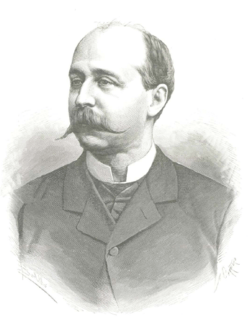Segismundo Moret

Segismundo Moret y Prendergast (2 June 1833 – 28 January 1913) was a Spanish politician and writer.
Biography
He was born in Cádiz on 2 June 1833. His mother's family, the Prendergasts, were of Irish descent. He studied at the Universidad Central in Madrid where in 1858 he became professor of political economy, continuing at the same time his studies in jurisprudence.
In 1863 he was elected representative to parliament as an independent representing the town of Almadén in the province of Ciudad Real. He was reelected in 1868 after the Revolution of 1868 and he took part in the writing of the new Spanish Constitution of 1869. He was noted for his eloquence.
As Minister of Overseas Colonies (Ultramar) in the government presided by General Prim in 1870 he pushed for the abolition of slavery and the creation of a constitution for Puerto Rico. In 1871 he was Minister of the Treasury (hacienda) in the first government of King Amadeo I and in 1872 he was appointed ambassador in London but resigned after some months and accepted a directorship in a large British bank.
With the restoration of the Bourbon dynasty to the Spanish throne in 1875 he returned to Spain where he founded the Partido Democrático-Monárquico party. He was again elected deputy for Ciudad Real in 1879, rallied to the monarchy in 1882. In 1883 he was appointed Minister of the Interior (Gobernación) and after 1885 he joined the Liberal Party in which he cooperated with Práxedes Mateo Sagasta as Minister of State (estado, foreign affairs, 1885–1888), Interior (Gobernación, 1888, 1901, 1902), Development (Fomento) (1892), State (Estado, foreign affairs, 1892, 1894) and Overseas Colonies (Ultramar, 1897–1898). When Sagasta died he participated in the quarrels for the control of the party.
In 1897 as Minister for Overseas Colonies (Ultramar) he decreed the autonomy for Cuba and Puerto Rico in a vain attempt to avoid their secession. He opposed the war with the United States in 1898.[1] In 1902 he collaborated in the creation of the Institute of Social Reform which was a precursor of the future Ministry of Labor.
In 1905, after the resignation of Montero Rios he became prime minister but he was forced to resign in July 1906 when he lost the majority in the parliament (Cortes Generales) although he became again prime minister for a brief period of the same year (30 November – 4 December).
After the bloody confrontations of the "Tragic Week" in 1909 in Barcelona he was again appointed prime minister after the resignation of Antonio Maura while he was also Minister of the Interior. He was forced to resign in February 1910 when he was replaced by José Canalejas. He denounced the Canalejas Ministry as 'a democratic flag being used to cover reactionary merchandise'. [2]
In 1912 Canalejas was murdered and the new prime minister, Álvaro Figueroa Torres, Count of Romanones, appointed him as president of the House of Representatives (Congreso de los Diputados) which he was until his death on 28 January 1913.
See also
References
- ↑
 Chisholm, Hugh, ed. (1922). "Moret y Prendergast, Segismundo". Encyclopædia Britannica (12th ed.). London & New York.
Chisholm, Hugh, ed. (1922). "Moret y Prendergast, Segismundo". Encyclopædia Britannica (12th ed.). London & New York. - ↑ Professor J. C J. Metford: The Spanish Anarchist Movement, 1908-75, Mastermind Quiz Book, 1984
| Political offices | ||
|---|---|---|
| Preceded by |
Representative for Almadén 1863 – 1868 |
Succeeded by |
| Preceded by |
Minister of Overseas Colonies 1870 |
Succeeded by |
| Preceded by |
Minister of the Treasury 1871 |
Succeeded by |
| Preceded by Manuel Rancés y Villanueva |
Ambassador to London 1872 – 1875 |
Succeeded by Manuel Rancés y Villanueva |
| Preceded by |
Minister of the Interior 1883 |
Succeeded by |
| Preceded by The Marquis of the Pazo de la Merced |
Minister of State 27 November 1885 – 14 June 1888 |
Succeeded by The Marquis of la Vega de Armijo |
| Preceded by |
Minister of Development 1892 |
Succeeded by |
| Preceded by |
Minister of the Interior | Succeeded by |
| Preceded by The Marquis of la Vega de Armijo |
Minister of State 5 April 1893 – 4 November 1894 |
Succeeded by Alejandro Groizard |
| Preceded by |
Minister of Overseas Colonies 1897 – 1898 |
Succeeded by |
| Preceded by |
Minister of the Interior 1901 – 1902 |
Succeeded by |
| Preceded by Eugenio Montero Ríos |
Prime Minister of Spain 1905 |
Succeeded by José López Dominguez |
| Preceded by José López Dominguez |
Prime Minister of Spain 1906 |
Succeeded by Antonio Aguilar Correa |
| Preceded by Antonio Maura y Montaner |
Prime Minister of Spain 1909 – 1910 |
Succeeded by José Canalejas |